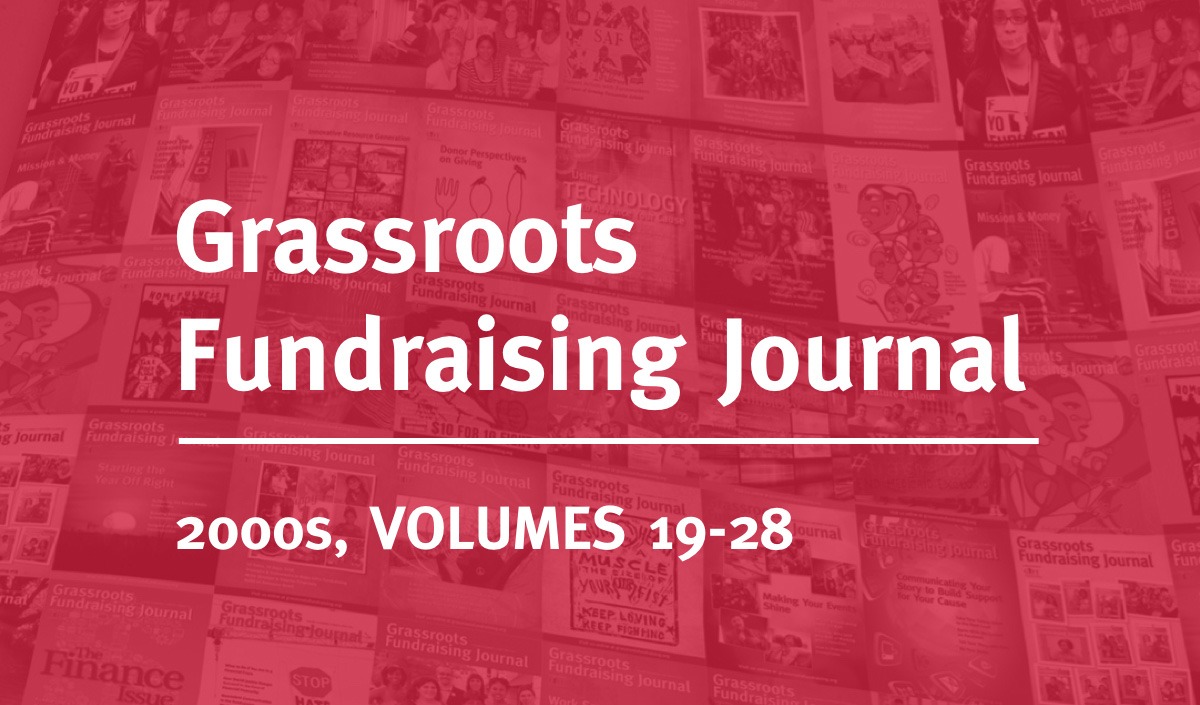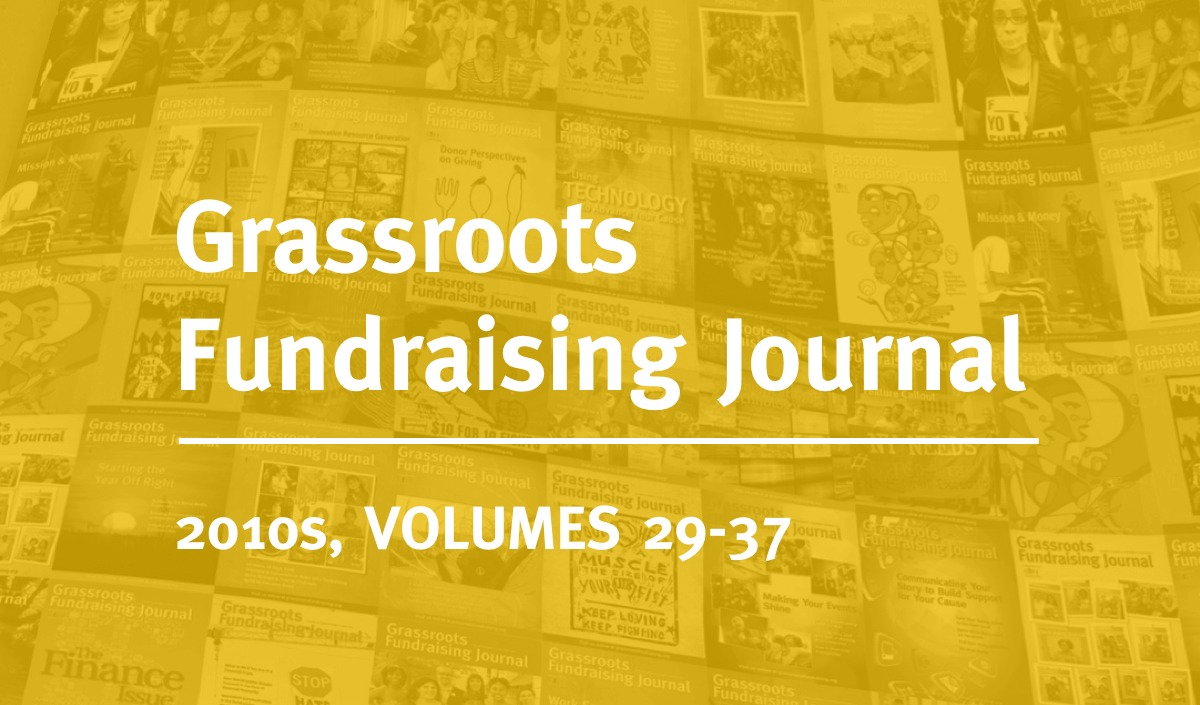
Editors’ note: This article, first published in print during February-1998, has been republished for Nonprofit Quarterly with minor updates.
What would you say if you could have a career that paid you a salary from $10,000–$150,000? Where your work had fairly measurable outcomes? Where talking about your values and writing about what you believe are part of the job? Where all the people you work with agree that what you do is really important?
Sounds like a great career, doesn’t it? It is; it’s a career in fundraising.
I have had many goals in my life, but my new goal is to have more people make fundraising their career. I have several reasons for wanting this:
- I have too much work, much more than I can handle. In another 10 or 15 years, I want to retire knowing that there are many other people able to do the work I was doing.
- I want fewer phone calls from headhunters, desperate executive directors, friends who sit on boards of directors, all saying, “Do you know anyone who can take our development job? We’ve looked everywhere. We’ve extended the deadline for applications indefinitely.”
- I want to see good organizations succeed in their fundraising, and one thing many groups need in order to succeed is someone who is paid to coordinate the organization’s fundraising efforts.
Of course, my goal is more specific than simply bringing new people into fundraising. What I really want is to bring a new generation into fundraising for progressive social change, which is at the lower end of the salary scale I mentioned above.
“But fundraising isn’t a cool career,” I hear you say. “Not like actually doing advocacy or service, or maybe even being a public interest attorney — being on the front lines of changing society.”
A woman I worked with in the past recently wrote to tell me that she had just left her fundraising position to take a job as an advocate in an agency serving homeless mentally ill adults. “I’m glad to have had this fundraising experience,” she wrote, “but it will be good to be out on the front lines again.” Her letter came on the same day as a phone call from another colleague who said, “I just have to get back into doing the real work. I can’t do this fundraising anymore.”
I know that we need organizers and attorneys and social workers. But none of these positions needs to be exempt from fundraising, and someone needs to be the main person in charge of that fundraising.
Before you dismiss a fundraising career as for nerds only, consider the following facts. Fundraising allows you — in fact, requires you — to talk to people whom you would probably never otherwise meet about what you believe in and the difference their money will make in translating those beliefs into actions. Fundraising gives you the chance to experiment with strategies. Will this letter work? Can you raise money on the Internet? Would people pay to come to this kind of event? While some strategies are formulaic — you follow a recipe and you can predict the result (comforting, but often boring), others are a combination of good luck, timing, and creativity.
Of course, fundraising does have its drawbacks. As with any difficult job, you have to be able to handle lots of tasks at the same time. In most organizations, the fundraising staff has a lot of responsibility with very little authority. People tend to blame the fundraising department for everything that goes wrong in the organization. People who have no knowledge of fundraising have unrealistic ideas of how much money can be raised in short periods of time. And worse, they tend to believe that all the organization’s problems can be solved by finding previously unknown, but very large foundations to get grants from, or by meeting lonely, generous, and previously unsolicited rich people.
Sign up for our free newsletters
Subscribe to NPQ's newsletters to have our top stories delivered directly to your inbox.
By signing up, you agree to our privacy policy and terms of use, and to receive messages from NPQ and our partners.
WHY FUNDRAISING IS COOL
Now I’m going to tell you why people think fundraising isn’t cool, and why they’re wrong. Let’s admit it, fundraisers are regarded with the same mixture of admiration, loathing, suspicion, and awe with which we in America regard money itself. And this explains some of the problems in attracting people to fundraising positions. Money is one of the great taboos of our culture. We are taught not to talk about it or ask about it, except to a very limited number of people in a very limited number of circumstances. As with the subjects of sex, death, mental illness, religion, politics, and other taboos, people say little about their experiences with money. If people are so carefully taught that it is rude to talk about money, it’s certainly not going to be easy to ask for it.
Yet, as George Pillsbury points out, “Although money cannot buy social change, no significant change can happen without it.” Organizations cannot do their work without money. An organization that does not have enough money to accomplish its goals winds up wasting the time of its volunteers and staff, and possibly hurting the constituency it claims to be working for.
When I decided to make fundraising my career 20 years ago, it wasn’t because I liked fundraising. In fact, like most people drawn to working for social change, I had wanted to do advocacy work. But I found that the advocacy work was not going to happen unless someone brought in money, and if I wanted to do work that was important and useful for the groups and movements that I cared about, fundraising was one of the most useful things I could do.
I also chose fundraising because it meant that I would have to talk about money, which, in a small way, could begin to break down the taboo that surrounds it. This taboo, I believe, helps promote both racism and sexism. If you can’t ask others at your workplace what they are earning, you will never know if minorities there are being paid less than whites or women less than men. That way, management has no fear that workers will seek more equitable salaries. The taboo supports the class structure in other ways as well. If only a tiny handful of ruling-class people understand how the stock market or other forms of investing work, they need not fear any threats to the economic system they control.
In fact, people who cannot talk about money, who will not learn to ask for it and deal with it, actually collaborate with a system that the rest of social change work seeks to dismantle. That alone makes fundraising not only a way cool profession but also a dangerous one. Here are some other reasons fundraising is exciting, sexy, and cool.
- Although there are technical aspects to fundraising, it does not require years of education. In fact, the three main requirements for success in fundraising can be found in people of all educational backgrounds: common sense, a basic affection for other people, and a passionate belief in a cause.
- Fundraising requires you to learn new things all the time while perfecting the set of basic skills you bring.
- Fundraising connects donors to an organization. Many donors have little relationship to the organizations they support aside from giving money. They don’t have time to volunteer, or they are not part of the constituency. A fundraiser helps them continue to feel connected and useful so that they will want to continue to give.
- Fundraising is organizing. Good fundraisers organize teams of volunteers to help with fundraising, and they should be teaching organizers how to ask for money, too. Organizers usually ask people only for time — go to a meeting, plan a strategy, come to a demonstration. Good fundraisers teach people fundraising skills and give them confidence that they actually can raise money. With a combined strategy of fundraising and organizing, people are asked for time and money — as much of either or both as they can give. A much wider range of gifts and talents and abilities can be brought out in our constituents by adding fundraising strategies to the mix.
- Fundraising will allow you, perhaps even force you, to confront basic issues of class in yourself, in your organization, and in the people you raise money for and from.
BECOMING A FUNDRAISER
You can get into fundraising in a variety of ways. One of the best ways to learn fundraising is to volunteer to help with fundraising tasks at one of your favorite organizations. Fundraising is in fact one of the few jobs for which volunteer experience qualifies you. Being on the fundraising committee of a board of directors or helping put on a special event has launched many a fundraising career. Interning with the fundraising department or staff person at an organization is another form of volunteering that can be very instructive.
You can also learn about fundraising in college classes and courses, but they only have merit if you have a way to apply what you have learned in a real-life setting. Working in a large organization as an assistant to the development director will give you a range of experience without requiring you to take on a lot of responsibility.
If you are serious about fundraising as a career, find a mentor. Many development directors enjoy mentoring people new to the field and can help you find your way through the difficult times.
And don’t hesitate to jump in at the deep end. Take a job that you are not totally qualified for, then read, take classes, use your mentor, and wing it. I have often encouraged organizations to stop looking for the person with perfect skills who may not exist, and instead to find a bright, hardworking, quick learner. Give that person a solid team of volunteers to work with and watch what happens. With enough support and a little latitude, this person is likely to be successful.
JOIN THE FRONT LINES
As you can see, when I say I want people to make fundraising their career, what I really mean is that I want people to say, “My role in working for social justice will be to help generate money.” Fundraising cannot be separated from its context. It is a necessary and central part of developing an organization and fulfilling its mission. It is real work, and though it takes place on a slightly different set of front lines, they are front lines all the same. The more fundraising is integrated into the rest of the organization, the more successful it will be, and the more fundraisers we can hope to have in the future. The sooner that happens, the sooner I can retire.









